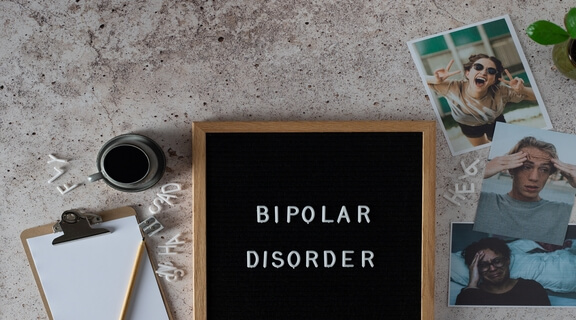Bipolar disorder is a health problem that affects 1 in every 100 people in the UK.
It has serious implications on a person’s mood–affecting their output, relationships, and day-to-day life.
As an employer, you have a duty of care to look after your staff. Our employee wellbeing services can help you fully understand bipolar disorders, as well as support staff through their condition.
Let's take a look at what bipolar disorder is, signs for the illness, and how to support employees suffering during work.
What is bipolar disorder?
Bipolar disorder is a mental health condition which causes extreme mood changes. This swing from one emotion to another is also known as manic depression.
People can experience feelings of hopelessness (depression) to intense energy or euphoria (hypomania)–all in the space of one episode.
Working full time with bipolar disorder can prove difficult for many employees. The spontaneous nature of the condition makes maintaining relationships difficult–both in professional and personal life.
For further insights in to dealing with depression read our article Depression and Self-Care
What are the signs of bipolar disorder?
Bipolar disorder is different for everyone who experiences it; and can last for weeks, even months.
Despite having a range of signs, we can categorise bipolar disorder into two types of episodes: depression and mania.
Depression
In common cases, people receive an early diagnosis for depression long before bipolar disorder. When someone goes through an episode of depression, they may feel:
- Emptiness and hopelessness.
- Reduced appetite or eating too much.
- Low levels of self-esteem.
- Social anxiety and withdrawal.
- Suicidal thoughts.
Hypomania and mania
Hypomania is the milder form, which doesn’t last long and has lower impacts on a person’s functionality.
Mania involves feeling high or extreme emotions–positive and negative. Some of the most common symptoms of mania:
- Feeling euphoric or excited.
- Having high energy levels.
- Speaking fast.
- Being easily distracted or irritated.
- Acting out of character.
- Feeling confident and untouchable.
What causes bipolar disorder?
We don’t exactly know what specifically causes bipolar disorder. But there are several things which may lead to its development. These include:
- Stressful or traumatic events.
- Genetic history.
- Chemical or intoxicant factors.
Bipolar disorder affects 1 in every 100 individuals; and people can be diagnosed at any stage of their life.
It’s commonly found in people between the ages of 15 and 40. And gender, race, and ethnicity don't play a huge defining factor either.
Different types of bipolar disorder
Bipolar disorder can be diagnosed into different types. These are determined by mood, episodes, symptoms, and effects. The different types include:
- Bipolar 1: Causes manic and depressive episodes which can last longer than a week.
- Bipolar 2: Causes milder mood swings (hypomania).
- Cyclothymia: Causes hypomania and depressive states which can last for years. (This can develop into Bipolar 1 and 2).
- Rapid cycling: Causes rapid mood swings, sometimes without warning or means to stop.
- Bipolar with mixed features: Causes mania, hypomania, and depression simultaneously.
Does bipolar disorder legally class as a disability?
In the UK, bipolar disorder can legally class as a disability, but only under certain conditions.
Under the Equality Act, the illness must have 'substantial and long-term effects on the ability to carry out day-to-day activities’.
The act states the disability must last for at least 12 months. And their condition shouldn’t allow them to perform regular work tasks, like efficiently using a computer.
As an employer, you also cannot discriminate against someone with a disability, as it counts as a protected characteristics.
If an employee mentions their bipolar disorder–or other health conditions–legally you must provide reasonable adjustments.
How to support an employee with bipolar disorder
Whatever their condition might be, remember you can work with bipolar disorder. It might seem difficult, but you have a legal and moral duty to support their needs.
Related article: Supporting an employee with bipolar disorder
Here's how to support an employee with bipolar disorder:
Offer medical referrals
If an employee suffers from bipolar disorder and work issues, offer support through medical referrals. This allows them to gain proper diagnosis for their condition.
They could be given medication or counselling such as cognitive behavioural therapy or CBD).
Make reasonable adjustments
One of the best ways you can help, as a business, is through reasonable adjustments.
This allows employees to continue working alongside their condition; and perform to the best of their ability.
Adjustments can range from amending their tasks to changing the dynamics of the work culture.
Keep open channels of communication
People with health conditions (especially mental health) often suffer in silence.
So, it’s important to keep open channels of communication and let them heal through talking. You'll be able to understand more about their specific condition, and see how you can offer tailored support.
Eliminate mental health stigma
Bipolar disorder and workplace discrimination continues to be a common workplace issue because of mental health stigmas.
So many employees refuse to disclose their illness, in fear of harassment or victimisation. You can eliminate stigmas through:
- Educating your staff about mental health.
- Offering emotional intelligence training.
- Reviewing workplace policies and practices.
- Encouraging workplace communication.




